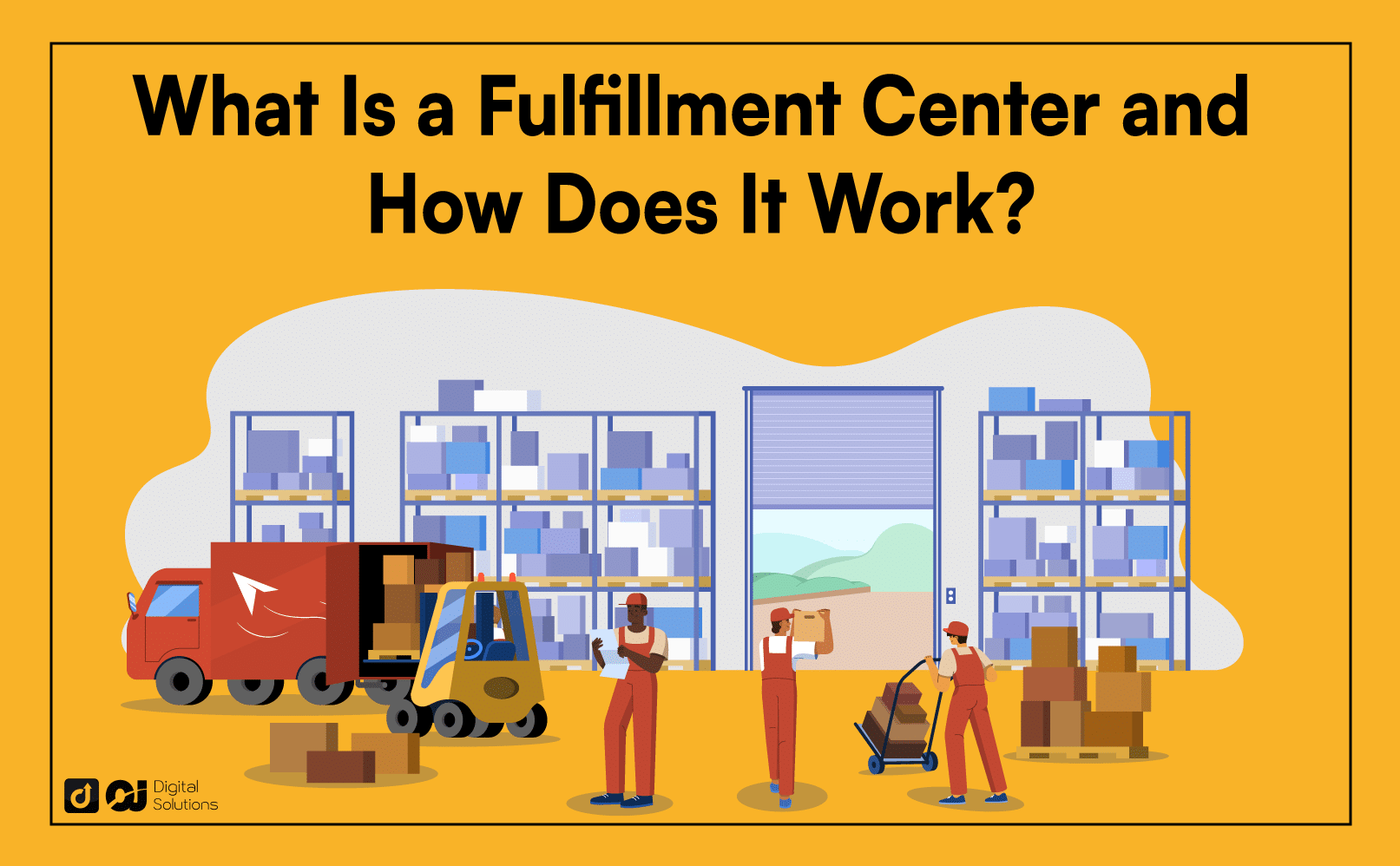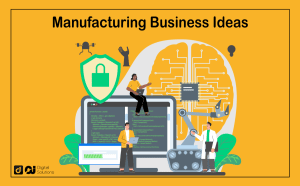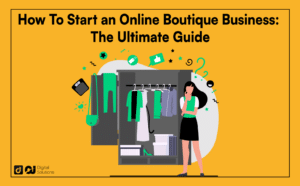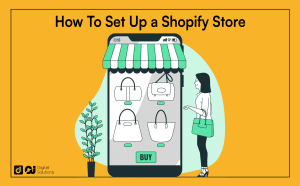Is your sales volume growing too fast that your ecommerce store struggles to fulfill customer orders on time? Partnering with a professional fulfillment center can help you scale your business further.
What is a fulfillment center? What does a fulfillment center do?
I wrote this article to answer these questions (and more) and discuss everything about fulfillment centers.
Let’s begin.
Fulfillment Center Definition: What Is a Fulfillment Center
Fulfillment centers (or fulfillment houses) receive inventory from ecommerce retailers (or their manufacturers), pack the products, and ship them to the customers on the retailers’ behalf. In short, they fulfill customer orders.
People sometimes incorrectly refer to a fulfillment center as a warehouse because of the aesthetic similarity. They both offer a physical space to store inventory.
However, these two spaces have different functions.
A warehouse only stores inventory.
Meanwhile, a fulfillment center offers more capabilities. A fulfillment center houses your products, packs orders, and ships them to your customers.
What Is a Fulfillment Warehouse?
A customer fulfillment center (or fulfillment) center is also known as a fulfillment warehouse.
However, a stand-alone warehouse drastically differs from this.
A warehouse stores your inventory, while a fulfillment warehouse stores products, pack orders, and ships them to your customers.
How Does a Fulfillment Center Work?

Fulfillment centers work by performing all fulfillment functions, including inventory management, picking, packing, order processing, negotiating rates with shipping carriers, and more.
When sellers outsource fulfillment, they send the products to their fulfillment partners to store, pack, and ship orders to the sellers’ customers.
A fulfillment provider handles fulfillment, letting ecommerce companies scale their businesses and focus on marketing, customer service, and sales.
Here are the functions of fulfillment services.
Real-time inventory management
Picking products, kitting, packing boxes, and assembling items
Order processing
Labeling shipments
Shipping orders
Managing returns
Warehousing and Fulfillment Services
Many ecommerce retailers leverage fulfillment centers as they scale their business.
The time and effort to pick, pack, and ship orders can take hours, making it challenging for companies to accomplish other essential business tasks.
Here are the activities fulfillment centers can perform.
Inventory Management
Retailers order products from their manufacturers and send them to the fulfillment center for sorting and storing. If the sellers manufacture their own products, they ship them directly to fulfillment providers.
Real-time inventory management and tracking aim to maintain a steady cycle of sales and replenishment, thus preventing stocks from staying on storage shelves for too long.
Inventory management also includes predictive analysis to help your ecommerce store (or ecommerce platform) adjust to meet your customers’ demands.
Picking and Packaging
Once your ecommerce business receives an order from a customer, your fulfillment center will pick up and pack the items later for shipping.
Kitting and Assembly
Many fulfillment centers offer kitting and assembly as their additional service.
Kitting and assembly involve packaging items that arrive as separate pieces in a single package.
Sellers promoting lesser-known products often include kitting in their marketing strategy.
Kitted products include subscription boxes, gift baskets, and custom-ordered merchandise.
Order Processing
Fulfillment centers are fast-paced environments with staff processing, packaging, and shipping orders to customers on time.
Fulfillment companies use sophisticated technology to manage and improve workflows, including order processing, inventory management, packing, and carrier pickup.
Companies can use AI to predict sales trends, manage inventory better, and keep the fulfillment process running smoothly.
Shipping Orders
After picking and packing orders, fulfillment centers deliver them to the customers through third-party shipping companies, although some providers like Amazon have their own transportation fleets.
You don’t need to find shipping partners or negotiate rates if you enlist the service of a fulfillment provider.
Fulfillment Center vs. Warehouse
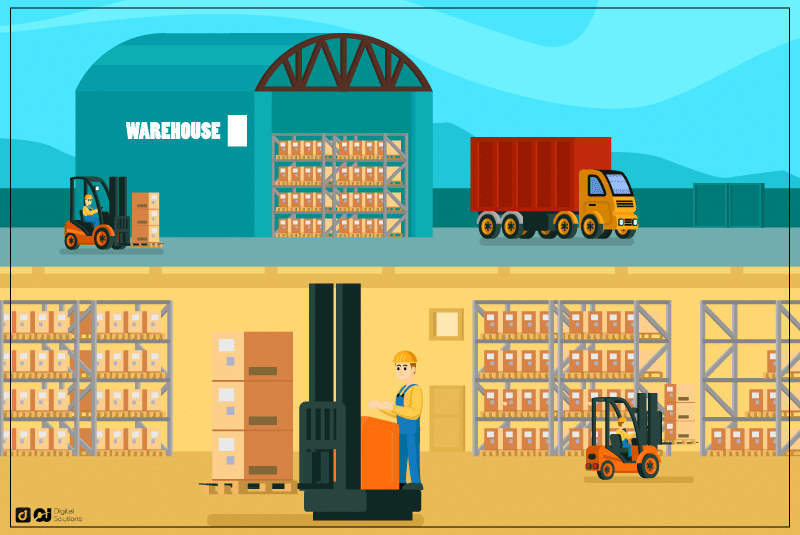
A fulfillment center and a warehouse look quite the same because they resemble a large industrial storage space.
A warehouse simply stores large quantities of products for an extended period.
Some companies with large inventories operate private warehouses, but many ecommerce businesses prefer renting an industrial warehouse.
Industrial warehouses offer business-to-business (B2B) services catering to multiple tenants, like merchants and online stores that need warehouse shelves to store excess inventory and off-season products.
Fulfillment centers store inventory and perform multiple functions, including picking up products, packing orders, and coordinating transportation or shipment. They ensure orders reach the customers.
Fulfillment centers enhance the customer experience by making same-day and next-day delivery possible.
When ecommerce businesses store their products in a fulfillment center near their customers, it helps reduce the shipping time and even their operational costs.
Amazon Distribution Center vs. Fulfillment Center
Many confuse a distribution center with a fulfillment center. A distribution center has a distinct function.
Fulfillment centers store, pack, and ship products to consumers.
Distribution centers house and ship products in bulk or pallets to retailers, wholesalers, or consumers.
Meanwhile, Amazon distribution centers store, pack, and ship orders to customers worldwide. Sellers in the FBA (Fulfillment By Amazon) program can send their inventory to these distribution centers and have Amazon handle packing and shipping orders on their behalf.
Under the FBA program, Amazon also handles customer service and product returns on behalf of sellers.
Another key difference between a distribution center and a fulfillment center is the type of customers they serve.
Distribution centers help manufacturers distribute goods (in bulk) to retailers, while fulfillment providers help retailers ship products to customers.
When you enter most fulfillment facilities, you’ll see an internal infrastructure with a pick-and-pack sortation system, pallet racking, robotic areas, and multi-level mezzanines.
By contrast, most distribution centers mainly consist of floor stacking and pallet racking systems.
Which Solution Is Right for Your Online Store?
Now that you know the different solutions (warehouse vs. fulfillment center vs. distribution centers) available to ecommerce retailers, you likely wonder which is ideal for your business.
If your goal is to reach a broader customer base and improve customer satisfaction, enlisting the service of a fulfillment company is ideal.
Choose a warehouse space if you only need a facility to store goods for an extended period. However, this option entails handling fulfillment in-house.
Your online store can ship orders to a wider customer base when you have a fulfillment partner with multiple locations.
Meanwhile, a distribution center is primarily for manufacturers that need to deliver products to their retail outlets.
What Are the Benefits of Fulfillment Centers?
Many successful retailers use a fulfillment company’s service for these benefits.
No Need To Invest in Physical Infrastructure
Many retailers need a physical space to house and process orders.
Renting, buying, or building a warehouse, fulfillment center, or physical storage space can cost thousands of dollars.
Thus, retailers prefer working with a full-pledged fulfillment company with hundreds or thousands of locations worldwide.
Lower Operational Cost
Fulfillment centers have specialized teams who manage inventories, handle orders, pack and assemble products, and perform other related tasks. Partnering with them can help you lower your staffing costs.
Partnering with fulfillment providers can also lower shipping costs because they often negotiate their rates with their carriers.
Faster Order Fulfillment Process
Fulfillment centers have the logistics to handle orders and ship products to a wider customer base.
Ecommerce sellers with an in-house order fulfillment process may not be too efficient when shipping products to customers.
Scalable Operations
Fulfillment centers can handle hundreds to thousands of orders daily, thanks to their logistics and efficiency. This speed makes scaling business operations easier.
Broader Customer Base
Partnering with a fulfillment provider with locations worldwide will let you ship orders to more customers.
Customer Satisfaction
First-rate ecommerce fulfillment centers are efficient and accurate in handling and shipping orders, ensuring speedy delivery and a positive customer experience.
Consumers nowadays demand on-time deliveries from ecommerce retailers. Failure to meet this expectation is detrimental to customer satisfaction.
Business Growth

By freeing you from order fulfillment tasks, you can focus on more important business aspects, such as boosting your brand awareness, marketing strategy, and operational efficiency.
What Are the Cons of Partnering With a Fulfillment Facility?
Order fulfillment services also have downsides you must consider.
Fulfillment Fees
Sellers outsourcing fulfillment operations must pay their providers for inventory storage, logistics operations, shipping costs, and store integration.
Shipping Time
Fulfillment centers can process orders faster than small or mid-sized online retailers.
However, the time it takes to ship a product from a facility to the customer largely depends on the proximity of your fulfillment partner’s facility to your customers.
Choose a fulfillment partner close to your target customers to avoid delays and disruptions.
Lack of Customization
The fulfillment operation’s main goal is to process customer orders quickly.
Providers rarely allow sellers to customize orders or add special touches, like personalized thank-you notes for each customer.
Lack of Control
As a seller, you may have little control when something goes wrong in fulfillment center operations, like damaged products, incorrect labels, and shipping delays. These issues can lead to negative feedback and lost customers.
Inventory Replenishment Delays
Most fulfillment centers require sellers to track and replenish their inventory as necessary.
Identify demand patterns, errors, and unexpected expenses to prevent inventory replenishment delays.
When To Partner With a Fulfillment Center
Only consider a fulfillment provider if your business has grown to the point that it requires outside expertise and logistical support.
These are valid reasons to partner with a fulfillment operation provider.
Frequent Shipping Delays in Domestic Packages
Most customers expect domestic packages to arrive within two to three days of the order confirmation.
If your ecommerce business often has shipping delay problems, partnering with a fulfillment provider with a strong infrastructure and wide reach can fix the issue.
Need To Ship Internationally
For a small- and mid-sized online retailer, shipping internationally is a complex and expensive process involving import duties, tariffs, regulatory requirements, customs, and restrictions.
A fulfillment partner can help you work around these expensive and complicated tasks.
Frequent Human Errors
Fulfillment and shipping operations use technology to track products along the entire supply chain, eliminating costly errors.
Partnering with a fulfillment provider lets you use their efficient logistics.
Frequently Asked Questions (FAQs)

How Do Shipping Fulfillment Centers Operate?
They process and ship customer orders. They have the logistics to store, assemble, pack, and ship an online order to a customer’s doorstep.
What Are the Four Types of Fulfillment?
These are the four types of fulfillment operations.
In-house fulfillment – The sellers fulfill customer orders.
Outsourced fulfillment – A fulfillment provider handles the storing, packing, and shipping.
Hybrid fulfillment – This operation combines in-house and outsourced fulfillment.
Dropshipping – This method is similar to outsourcing fulfillment, although the dropshipper doesn’t own the inventory.
What Is an Amazon Fulfillment Center?

The facility stores products and employs associates who pick, pack, and ship orders to customers.
Amazon has around 1,140 fulfillment centers in the US.
Fulfillment by Amazon, more commonly known as FBA, is a service that helps Amazon sellers outsource their fulfillment operations.
What Is a Miro-fulfillment Center?
A micro-fulfillment center or MFC is a small storage facility catering to ecommerce companies that need to store their inventory closer to their customers to reduce costs and transit times.
MFCs have high-level automation to fulfill online orders and local store pickups quickly and efficiently.
What Is a Local Fulfillment Center?
Local fulfillment centers are compact warehouses and fulfillment facilities built within or added to a store.
Some people use the terms local fulfillment center and MFC interchangeably.
What Is Vendor Fulfillment?
Vendor fulfillment is just another term for a fulfillment center.
What Is an Online Fulfillment Center?
This fulfillment center picks, packs, and ships online orders to the customer’s doorstep.
What Is the Difference Between Fulfillment Service and Dropshipping?
Dropshipping involves companies selling products through their websites or other channels even though they don’t own the inventory.
A fulfillment provider prepares and ships orders to the customers’ doorsteps. These products are from sellers who have full ownership of the inventory.
What are Logistics Fulfillment Services?
Fulfillment logistics involves packing boxes, assembling and labeling products, storing inventory, and transporting orders on time.
What Is the Difference Between a Warehouse and a Fulfillment Center?
A warehouse is a space for storing inventory.
A fulfillment center stores, packs, loads, and ships products on behalf of the sellers.
What Is the Best Storage and Fulfillment Service?
The best provider boils down to your needs and budget.
Choose a partner with strategic locations, impressive shipping speed, different packaging options, and returns management.
If you still haven’t found a fulfillment partner, consider these providers.
Fulfillment by Amazon
ShipBob
Whitexox
FreightPros
FedEx Fulfillment
Rakuten Super Logistics
ShipMonk
Who Ships From Radial Fulfillment Center?
Radial, Inc. is a Pennsylvania-based company that offers ecommerce fulfillment services.
Here are some of Radial’s popular clients.
Zara
Dick’s Sporting Goods
Hugo Boss
Costco Wholesale
Puma
The Bottom Line
Find a fulfillment partner to help you further scale your business.
However, when outsourcing fulfillment, you lose control over your inventory and shipping process.
If you want to maintain more control over your inventory, shipping process, branding, and packaging, consider Amazon Direct Fulfillment instead.

